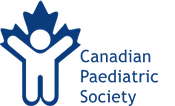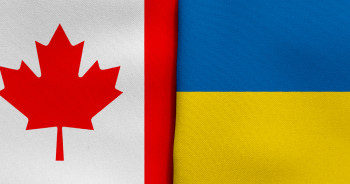War in Ukraine echoes loudly in Canada: Let’s do what we can
By Ruth Grimes, MD, FRCPC, Canadian Paediatric Society President
It is a relatively warm day (-10° C) in Winnipeg. The sky is clear and the now-familiar blue and yellow Ukrainian flag blazes brightly in the sunshine on the flag pole in our front yard. I bought a Ukrainian flag this week to fly beneath our Canadian one.
I’m thinking about how I am safe and warm, have food and shelter, and live with the knowledge that my husband and our three adult children are also safe and healthy. Despite this, and so much more, I am not feeling secure.
I am saddened, distressed, incensed and anxious over Russia's invasion of Ukraine, the homeland of my maternal grandfather.
“Pop”, as my mother, aunts and uncles called him, was born in Lviv, Galicia, now modern-day western Ukraine, and emigrated to the United States in 1905. I fear for the generations of my grandfather's family living there still, and I cherish the culture and traditions that were passed down to me.
I think about how another powerful country invaded and annexed territories that they felt they had a right to, and how these actions triggered a world war. My then 18-year-old British father join the army at the outset of the Second World War, and was wounded in France in 1944. After the war, he attended university and medical school, moving to the U.S. to study paediatrics, where he met my mother, a paediatrics resident herself.
I feel blessed not to have been a child victim of war, yet my parents’ wartime experiences did affect me. My father never really talked to me about the war but for a few amusing anecdotes involving his friends, and a very clinical description of the day he was “blown up” by a land mine while riding in an armored car. He modeled gentleness, kindness, self-sacrifice and charity in his personal and professional life and I try to emulate him to this day. He was calm and quiet, perhaps the “stiff upper lip” Englishman that Brits are typically thought to be, but he was never complacent and always took an interest in what was happening in the world.
My mother—who was 10 when the war started and whose three brothers fought (one made prisoner of war after the Battle of the Bulge and one who helped liberate Bergen Belsen)—made sure my brothers and I knew of the religious and ethnic hatred that drove some of the worst events of World War 2. We learned of the physical and emotional toll the war had on my uncles and the family they left behind. My mother wanted us to remember how these events affected our family and the world. For in forgetting history, we run the risk of repeating it.
As war rages in Ukraine and threatens to spill over into northern and eastern Europe, we cannot be complacent. As paediatricians, as physicians, as Canadians, we mustn't be silent. We must act.
I encourage all CPS members to support humanitarian efforts to Ukraine. Among the options to do this are through the Canadian Red Cross, where in the federal government is matching donations, or CARE, whose efforts prioritize families, women, girls and the elderly.
I also encourage members to go to the federal government’s website for information on Canadian sanctions, export controls and humanitarian aide. While there are controls on exports of certain goods and technologies to Russia, control on imports is not addressed. The Canadian Paediatric Society will work with the Canadian Medical Association and other medical professions on matters relating to Russian imports.
I encourage all CPS members to support anti-war protests, in whatever way makes sense for you.
Please also remember that your patients and families may need support during these troubled times. Our document for parents, Helping Children and Teens Cope with Stressful Public Events, may be a helpful resource.
The CPS stands with the Government of Canada in support of the sovereignty of Ukraine and with international paediatric medical partners organizations, who continue to advocate for humanitarian support.
Copyright
The Canadian Paediatric Society holds copyright on all information we publish on this blog. For complete details, read our Copyright Policy.
Disclaimer
The information on this blog should not be used as a substitute for medical care and advice. The views of blog writers do not necessarily represent the views of the Canadian Paediatric Society.
Last updated: May 10, 2022

